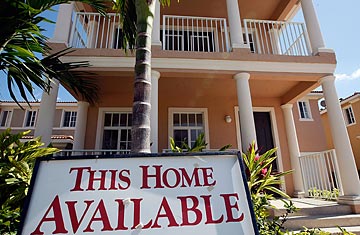
A house for sale in Miami
It's hard to drive down a residential street in Miami Gardens, Fla., and not see two, three, four houses in foreclosure. Some have been on the auction block since last year; they are once handsome, pastel-colored ranch houses that are now surrounded by waist-high weeds or boarded-up windows. "The tarp on that busted roof is about to disintegrate, it's been there so long," says Andre Williams, a Harvard-educated real estate attorney and Miami Gardens city councilman, pointing at one of the houses and shaking his head at the state of the solid middle-class, African-American community he grew up in. "We had a 70% homeownership rate in this city. We took a lot of pride in that."
But the city of 110,000 people just north of Miami is staring at another figure today: a 13% home-foreclosure rate. That's the second highest in Florida, a state that now has the nation's highest rate of homes — 23% — either in foreclosure or delinquent on mortgage payments. Many of the mortgages that have collapsed in Miami Gardens were subprime; city leaders like Williams say they were ethically questionable deals pushed by banks that too often knew their clients were in over their heads.
For that reason, Williams believes those lenders need to step up and do more to help struggling local homeowners revise their loans and hang on to their houses — and he wants to give his frustrations some legal teeth. Williams has proposed a city ordinance that could penalize banks that fail to offer modifications before starting foreclosure proceedings. Local governments have no formal legal oversight over banks, but under Williams' ordinance, if a lender's number of foreclosure actions in Miami Gardens over a designated period exceeds the number of loan modifications it offers to financially burdened or delinquent homeowners, the city would pull its accounts or other business from that bank. "The taxpayers put these banks back on solid ground with the bailouts," says Williams, "and now it's time the banks did the right thing themselves."
Despite his grass-roots support, it's uncertain if Williams can muster a council majority next month to pass the ordinance, which would likely be the first such law to emerge amid the Great Recession. (A Pennsylvania judge last year mandated a program in Philadelphia that requires lenders there to at least participate in a modification-mediation process before resorting to foreclosure.) John Mechem, spokesman for the Mortgage Bankers Association in Washington, D.C., argues the ordinance is "ill-conceived" because it would "encourage banks not to do business [in] the city, which would limit competition." But even if it doesn't pass, the effort reflects the impatience many communities have with the banks they believe helped lure them into the housing horror. And it echoes the Obama Administration's exasperation. Treasury Secretary Timothy Geithner recently chided banks for their poor loan-modification performance: so far only 9% of the 3 million–plus at-risk mortgagees have received relief, like rate or principal reductions to reduce monthly payments, despite the federal Making Home Affordable Program. This year MHA made $75 billion available to the nation's 38 major home lenders for that express purpose.
Miami Gardens officials acknowledge that they don't know what percentage of their at-risk homeowners have gotten loan modifications. (Williams' ordinance would also require the banks to provide that data.) But the spike in foreclosure signs tells them it's too few. And given the city's grinding 15% unemployment rate, many believe they have no choice but to try to leverage banks into taking MHA more seriously.
